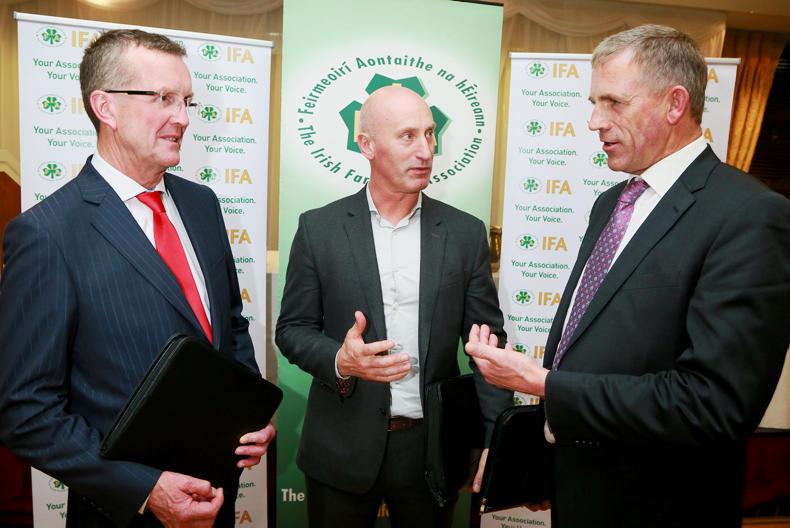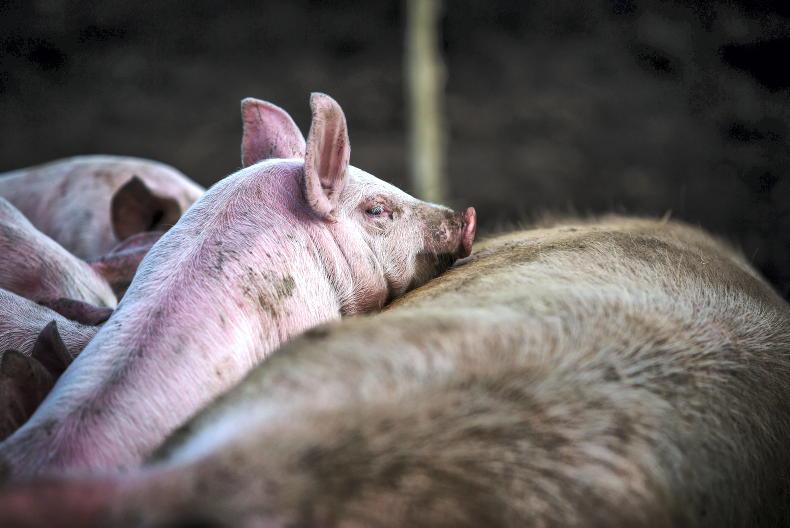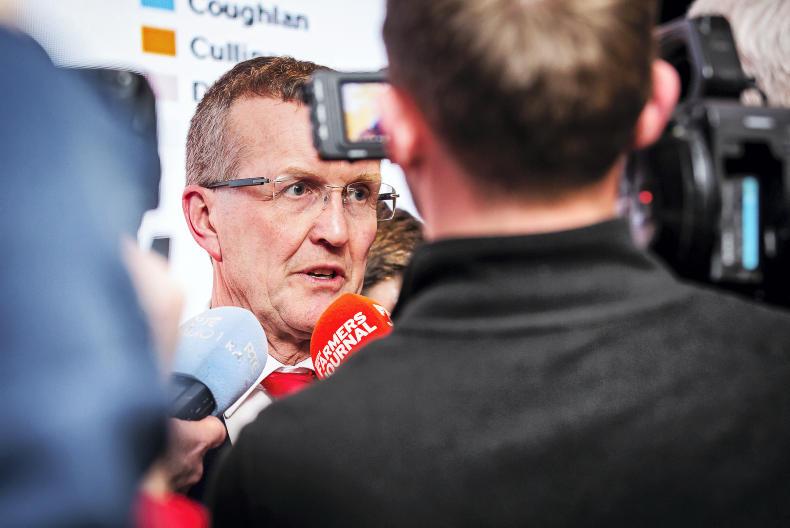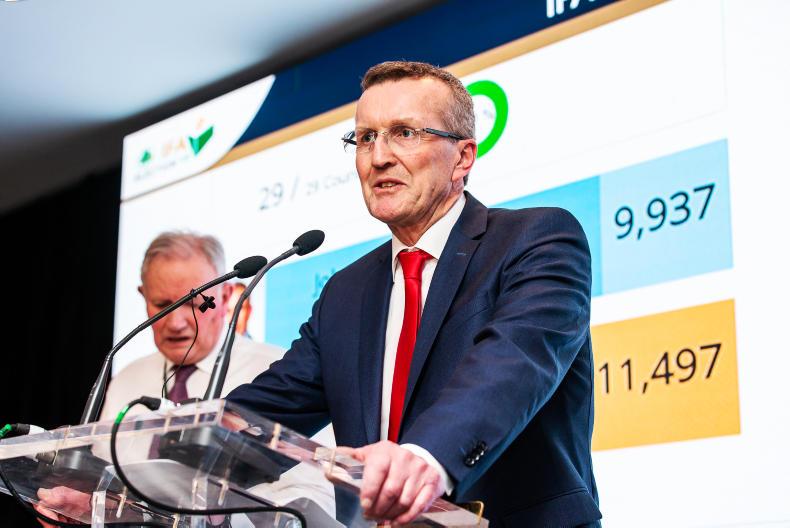Farmer bashing, the beef protests and farm incomes were the hot topics for more than 250 farmers in Tipperary on Thursday night.
RTE’s climate-focused programme What Planet Are You On raised the temperature, with both candidates and members concerned about how farming is being portrayed in mainstream media.
Ruadhri Deasy asked the candidates whether they believed climate change was a hoax, with none taking the bait.
Pointing out that farmers were being pilloried “from Billy to Jack and blamed for everything”, Deasy asked them where they would position the IFA in the fight to defend farming.
Cullinan said the Government needed to wake up and take account of carbon sequestration by grass and hedgerows. He would, if elected, get Teagasc back in to research what farming could contribute to the environment.
RTE, a state agency, coming out telling people not to eat dairy and beef - not good enough. Where is Bord Bia in all of that? we have to ask. @TimCullinan_IFA
— IFJCaitriona (@IFJCaitriona) November 14, 2019
Woods said he was convinced that, in time, the science would change depending on who was promoting it.
“We have a lot of good stories. We are part of the solution, not the problem but we are not winning the argument.
“We need strong independent science to back up our position,” he said. “We need to get on the front foot.”
Coughlan said farmers need to challenge the carbon accounting system. He added that he was calling for a European-funded green fund to pay for environmental goods produced by farmers.
“Farmers need to be supported if they are taking a clattering for doing something for the good of society, they should be compensated by society.”
Thurles suckler, beef and sheep farmer David Clarke asked the candidates what lessons had been learned by each of them from the beef protests.
He described them as a “fiasco”.
“Grassroots members broke away to deal with something the leaders could have done. I felt it was badly handled by everyone and left the factory with even more power than before,” he added.
"We need fwd contracts & future pricing for beef, we have to get it & beef taskforce is the way to push that through" - @JohnCoughlanIFA
— IFJCaitriona (@IFJCaitriona) November 14, 2019
Responding, John Coughlan said that the issue was well discussed but the IFA felt that it was no time to close factories, with Irish prices the second highest in Europe at the end of July. It felt that south American beef flooding into Europe and undermining prices was the bigger problem.
“What we learned is that we need to be a hell of a lot better at communicating ot our members what the real problems are,” he said.
Tim Cullinan said there was a vaccum created when a group of beef finishers approached the IFA in 2014 and then again in 2019.
“They were genuine finishers with what I thought was a reasonable request, to create subgroup to feed their concerns into the livestock committee. The rest is history,” he said. “20,000 of our members, many of the still our members, moved to another group.”
Any real solution for Irish farming will be based on European mkt - we export 50% of all produce & 90% of beef - @woods_angus
— IFJCaitriona (@IFJCaitriona) November 14, 2019
Angus Woods, current chair of the livestock committee, said that he believed it was “the right decision but poor communication”, having earlier outlined how European prices were below Irish prices at the time.
“A vacuum will be filled by populism and fake news,” he said.
Bord Bia’s role in beef labelling and marketing was raised by both candidates and farmers from the floor.
Responding to claims from the floor about imported meat, Woods reiterated the fact that only meat from animals born, reared and slaughtered in Ireland could be labelled as Irish meat.
Cullinan told the crowd that a DNA database for pigs was used to prove the nationality of pigmeat, saying that BVD tissues samples should be used to build a smilar beef database.
Coughlan said the IFA had to ensure that Bord Bia is consistent in its labelling.
The effect of convergence on farm payments was raised in both the debate for deputy president and president.
Deputy presidential hopefuls Thomas Cooney and Brian Rushe were asked how convergence had affected them.
Cooney outlined in detail how much money he had lost over the past 10 years.
“I’m a dairy and beef farmer, my payment has gone from €16,000 10 years ago to €13,500 now through convergence,” he said, adding that he lost €5,000 between REPS 4 and GLAS, and €1,000 through ANC cuts.
“I’ve been badly affected by convergence but worse affected were suckler farmers around me,” he said, pointing out that they had lost money on both cattle prices and convergence.
“Some of them have been decimated,” Cooney said, calling for an environmental scheme worth €10,000 per farm and an increase in ANC “with no reduction in production!”
Extra chairs & even steps being occupied as main @IFAmedia presidential debate gets underway in #tipperary. pic.twitter.com/WRkGaPY0wv
— IFJCaitriona (@IFJCaitriona) November 14, 2019
Rushe described convergence as a “blunt tool and a populist policy position”.
“Convergence doesn’t work. Viable farms should not be made unviable,” he said. “This is a fight that affects 90% of our members and I will fight it.”
Viable farms should not be made unviable
For young farmers Rushe said he was seeking a farmer-friendly earliy retirement scheme that would work for both the parent and child.
He proposed a Knowledge Transfer-type mentorship scheme for young farmers to learn from older and more experienced farmers.
Meanwhile, the deputy presidential candidates have agreed not to debate against each other in Cavan next week.
The hustings continues on Monday night in Letterkenny, Co Donegal.









SHARING OPTIONS